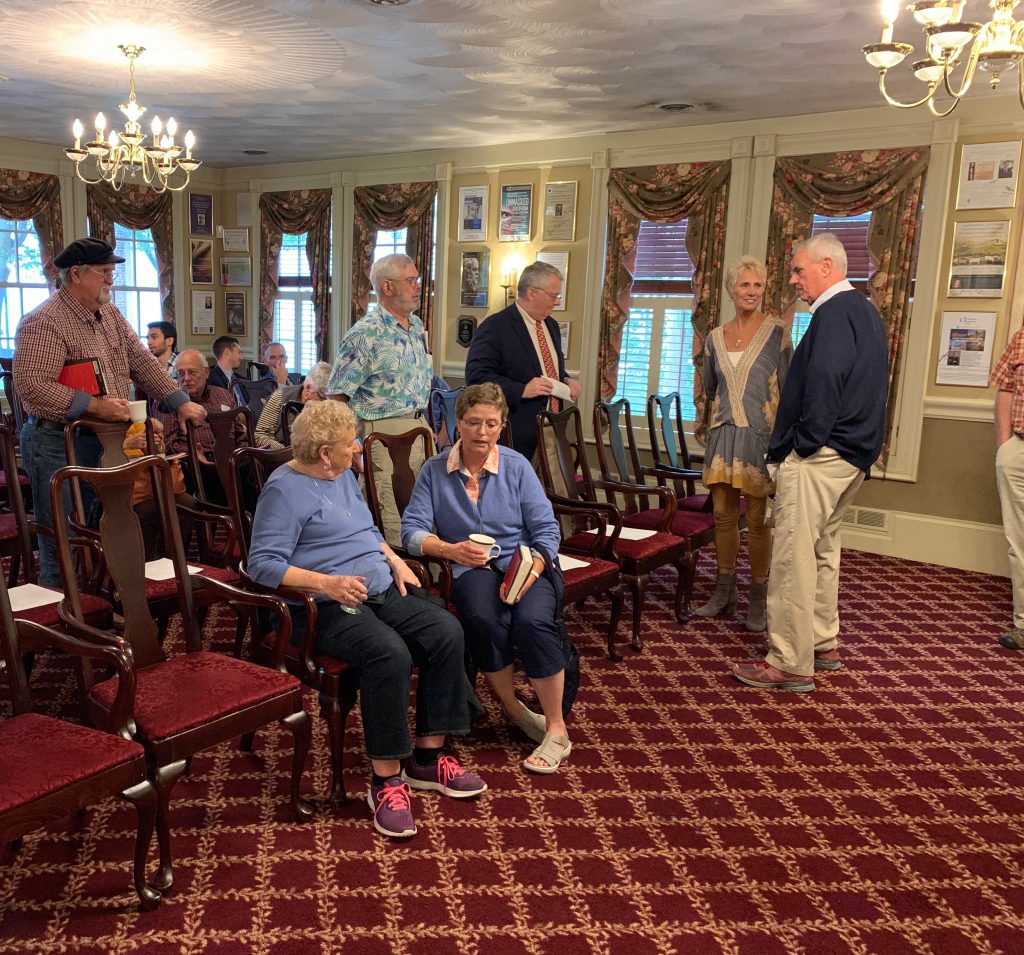On Sunday, September 15, the Alexander Hamilton Institute for the Study of Western Civilization (AHI) held the Twelfth Annual David Aldrich Nelson Lecture in Constitutional Jurisprudence. AHI President Robert Paquette spoke on “Federalist #39 and the Coming of the Civil War.” The event also featured an open house and book-signing by AHI Resident Fellow Mary Grabar, whose book Debunking Howard Zinn: Exposing the Fake History that Turned a Generation against America (Regnery, 2019) has reached best-seller status on Amazon.com.
Paquette began his lecture by informing the audience of the remarkable achievements of Judge Nelson (1932-2010), and his immediate family. A graduate of Hamilton College, valedictorian of his class, in 1954, he attended the Harvard Law School and read law as a Fulbright Scholar at Cambridge University, in England. President Ronald Reagan nominated Mr. Nelson to the United States Court of Appeals for the Sixth Circuit, and he was confirmed in 1985. Judge Nelson was held in high regard by colleagues on the bench for the depth of his legal erudition and the clarity of his writing. Paquette also acknowledged Carl Menges, a Hamilton College alumnus, who celebrated his eighty-ninth birthday on Constitution Day. Without the exceptional generosity of Mr. Menges, Paquette noted, AHI would not exist.
Paquette focused his lecture on the idea of sovereignty, which he called one of the most interesting and vexing problems in political theory. He reminded the audience how the word had surfaced prominently in such issues as Brexit, genocide, the recent Supreme Court case of Gamble v. U.S., and the protests in Hong Kong. The word appears more than thirty times in The Federalist but is never defined. James Madison wrestles with the word in Federalist #39 in trying to explain how the federal arrangement under the Constitution will divide sovereignty between the states and the “general government.”
Although many scholars have identified Federalist #39 as one of the fifteen or twenty most important numbers of The Federalist, few have explained why, or if they do explain, they stress Madison’s comments on the republican character of the Constitution not his discussion of sovereignty. Indeed, as Paquette indicated, one would be hard-pressed to find in scholarly journals one essay devoted to Federalist #39. He suggested that Madison composed #39 with Brutus #6 in mind, for Brutus (most likely Robert Yates of New York) had published a few weeks before in #6 a ferocious attack on the architecture of the Constitution for providing the general (read national) government with a “consolidating” power that would eventually “annihilate” the state governments.
In commenting on Madison’s confusing discussion of sovereignty in #39, Paquette identified two different understandings of the word that existed in the eighteenth century and beyond, one medieval in origin and one modern. Partible sovereignty accorded with the medieval understanding. The modern understanding, traceable to the work of Jean Bodin and Thomas Hobbes, regarded sovereignty as indivisible. The Civil War (War for Southern Independence), Paquette contended, was a death struggle over the meaning and locus of sovereignty in the fundamental law of the United States. John C. Calhoun, building on documents generated by Madison and Jefferson during the crisis over the Alien and Sedition Acts, formulated a theory of sovereignty based on the modern understanding of the word as identifying an indivisible, absolutist power. Calhoun located it in state conventions since they were the instruments that had ratified the Constitution. Of the eleven state governments that formally seceded from the United States to form the Confederacy, all but one (Tennessee) held elections to special state conventions in order to legitimate their actions as constitutional.
“The unifying idea in Professor Paquette’s thoughtful and timely lecture,” said AHI Charter Fellow James Bradfield “is the definition of sovereignty and the locus of that power as established by the Constitution. Federalist #39 did not clarify the locus of sovereignty in the proposed constitution unambiguously.”
Edward Shvets, leader of AHI’s Undergraduate Fellows Program at Hamilton College, enjoyed the lecture. “In his insightful and pithy Constitution Day lecture,” Shvets observed, “Professor Paquette not only filtered polluted air surrounding sovereignty but also underscored how better understanding the term allows us to fully appreciate the American form of government—one that is exceptional in both principle and precedent.”
Bryce Murdick, a Hamilton College student/athlete effused, “Not only was the food great, and the conversation stimulating; the main event was truly edifying. Dr. Paquette, in the style employed during his classes, took on the part of a modern Socrates to implore listeners to examine their actual understanding of a word and concept with which many would claim proficiency. The topic of this lecture was sovereignty, explored through the American founding and Federalist 39. In contrast to Socrates, at the close of Dr. Paquettes lecture one walked away not in a state of aporia – but with a heightened understanding of the confluence of history and politics.”
Rodger Potocki, a retired businessman, and his wife Chris, a banking executive, summed up the feelings of many: “We thought the event was great.”



Leave A Comment